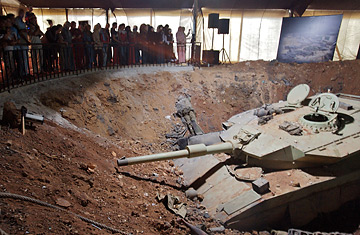
A captured Merkava tank is displayed at an exhibit of artifacts organized by Hizbollah on the occasion of the first anniversary of the 2006 war against Israel.
Ever wonder what it's like inside a Hizballah bunker but not so eager to get kidnapped just to find out? Well, for a short time and a short time only, anyone in Lebanon can experience the next best thing by visiting the new Hizballah museum in the southern suburbs of Beirut, where there is no admission charged and no blindfold required.
Imagine Britain's Imperial War museum with an Islamist militia makeover, and you've got the strangely-named "Spider Web" museum, built to commemorate Hizballah's "Divine Victory" over Israel after their 34-day war last summer, which ended a year ago yesterday. Though just a temporary installation built on the rubble of a building destroyed during the war, the museum showcases the guerrilla organization's trademark attention to detail and its fearsomeness.
Designed like a sandbag fortress rising over a garden of inert land mines, armored vehicles and the occasional palm tree, the museum contains a display of Hizballah weapons and tactics, including the scale recreation of a front-line bunker, complete with computer workstation, prayer rug and dish rack. Throw in a lava lamp and it could be a college dorm room.
Besides diagrams of the latest in Iranian and Russian anti-tank rocketry, and an ultra-violent Hizballah special forces video game, the most impressive display is a plaque listing every single Israeli warplane that bombed Lebanon during the war along with their squadron ID and home bases. Not only did Hizballah survive the bombardment, but its observers still had the presence of mind to keep score. Not bad for 3,000 regular fighters up against a regional superpower.
The Israelis portrayed in the museum are either dead (in mannequin form) war-crazed (in photos of Israeli school children writing hate messages on artillery shells) or incompetent. "We will eradicate Hizballah within three days," trumpets a poster of former Israeli General Dan Halutz, while next to him former Defense Minister Amir Peretz looks through a pair of binoculars with the lens caps still on.
All this "Death to Israel" stuff is of a piece with normal Hizballah propaganda. But what's different about the Spider Web museum as a whole is the macho, bragging tone. Hizballah was once famous for being one of the few Arab organizations that let its actions speak louder than words. The swagger shown since last summer is both a sign of newfound confidence, and of weakness. For though Hizballah may have won the war against Israel, it has not yet won the peace.
After the war, Hizballah launched a campaign to topple the current American-supported Lebanese government, which it accuses of collaborating with Israel to destroy Hizballah's existence as a state within the Lebanese state. But the Hizballah-led opposition campaign has stalled — they've been stuck in protest tent camps in downtown Beirut for the last eight months — in part because many Lebanese resent the fact that Hizballah unilaterally sparked a war that ended with almost 2,000 dead and billions of dollars in damage.
Plus, the cease-fire that took effect one year ago yesterday left Hizballah vulnerable. There are now some 13,000 United Nations soldiers enforcing the peace in southern Lebanon, making it difficult for the group to rearm on its favorite turf. Moreover, a U.N. investigation into a series of political assassinations in Lebanon is closing in on Hizballah's patron-state, Syria, and there's talk of deploying U.N. troops along the border with Syria to prevent arms smuggling to Hizballah. To top it off, Israeli hawks say it's just a matter of time before their army returns to Lebanon to finish the job for good.
But the only thing more dangerous than a victorious Hizballah is a weakened Hizballah. If the U.N. soldiers in Lebanon ever started to seriously cramp Hizballah's style, the peacekeeping force would be toast. Lebanese history is littered with examples of foreign armies meeting their fate in this fractious hill country. Hizballah itself was born from the carnage of the disastrous 1982 Israeli invasion. A massive new invasion would only bring a pyrrhic victory at best. If Israel leveled half of Lebanon, some new danger would emerge from the rubble. "If you, the Zionists, are considering attacking Lebanon, I am reserving a surprise for you that will change the fate of the war and the region," said Hizballah leader Hassan Nasrallah in a speech last night. Long-range missiles? A war pact with Hamas and Iran? Weapons of mass destruction? Whatever Nasrallah's surprise, it wasn't on display at the war museum.
